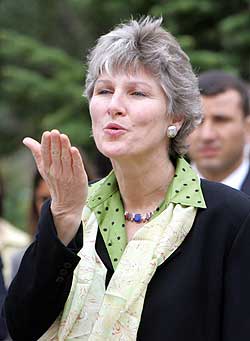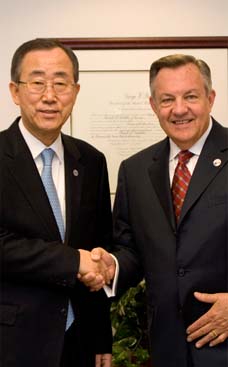2007.11.03: November 3, 2007: Headlines: Diplomacy: Public Diplomacy: National Review: David Frum writes: On the Resignation of Karen Hughes
Peace Corps Online:
Peace Corps News:
Library:
Peace Corps: Public Diplomacy:
Peace Corps: Public Diplomacy: Newest Stories:
2007.11.04: November 4, 2007: Headlines: Diplomacy: Public Diplomacy: Houston Chronicle: Houston Chronicle writes: Karen Hughes' slim qualifications and the administration's policies, her work as U.S. public diplomacy chief came close to nothing :
2007.11.03: November 3, 2007: Headlines: Diplomacy: Public Diplomacy: National Review: David Frum writes: On the Resignation of Karen Hughes
David Frum writes: On the Resignation of Karen Hughes

Let's say some Muslim leader wanted to improve Americans' image of Islam. It's doubtful that he would send as his emissary a woman in a black chador who had spent no time in the United States, possessed no knowledge of our history or movies or pop music, and spoke no English beyond a heavily accented ‘Good morning.’” But even had Hughes spoken fluent Arabic and spent years in the region, her project still would have disastrously failed. It was President Bush himself who explained why. According to him (in for example his speech to the UN in September 2006), Middle Eastern violence has its origins in Middle Eastern political, economic, and social failures of the Middle East. Thus President Bush at the UN in September 2006: “For decades, millions of men and women in the region have been trapped in oppression and hopelessness. And these conditions left a generation disillusioned, and made this region a breeding ground for extremism.
David Frum writes: On the Resignation of Karen Hughes
On the Resignation of Karen Hughes
In the movie “Wag the Dog,” an embattled president hires a Hollywood producer to retrieve his image. The producer presents the president with a speech. Top aides read it over and pronounce it “corny.” The producer explodes in rage. “Corny? Corny? Of course it’s corny!”
Nobody except extreme political junkies had ever heard of Karen Hughes back then. But soon all the world was to become familiar with the style of work anticipated by the authors of “Wag the Dog.” As ne of the most trusted aides of George W. Bush, Hughes served in 2001-2003 White House communications director, and thus incidentally, my boss.
In 2005, Bush assigned Hughes responsibility for America’s public diplomacy – raising the country’s image in the world. Hughes resigned this week, to almost unanimously negative reviews.
Why did Karen Hughes so signally fail? Hint: It was not just her corniness. No, the real problem was a massive, central failure of strategy – a failure that now threatens the success of the entire Bush foreign policy.
As Undersecretary of State for Public Diplomacy, Hughes focused her attentions on the Middle East.
For this job, she was never a natural candidate. As one critic wrote soon after she started work in the spring of 2005:
“Let's say some Muslim leader wanted to improve Americans' image of Islam. It's doubtful that he would send as his emissary a woman in a black chador who had spent no time in the United States, possessed no knowledge of our history or movies or pop music, and spoke no English beyond a heavily accented ‘Good morning.’”
But even had Hughes spoken fluent Arabic and spent years in the region, her project still would have disastrously failed. It was President Bush himself who explained why. According to him (in for example his speech to the UN in September 2006), Middle Eastern violence has its origins in Middle Eastern political, economic, and social failures of the Middle East. Thus President Bush at the UN in September 2006: “For decades, millions of men and women in the region have been trapped in oppression and hopelessness. And these conditions left a generation disillusioned, and made this region a breeding ground for extremism.”
If this analysis is correct, Middle Eastern extremism would not respond to a “talking cure.” It will abate only when political conditions in the region are changed. Which suggested that Hughes’ attempts to win over Middle Easterners by presenting the United States as a country that shared their values and respected their faith was doomed from the start.
And so it proved.
Hughes reacted by redefining her mission. Instead of representing the administration in the Middle East, Hughes began to see it as her job to represent the Middle East to the administration. She became an advocate for downplaying the democracy initiative and reviving Israeli-Palestinian talks.
But this too created a paradox. If only actions, not words, could change the Middle East, then the United States was going to need help – and allies. In which case, the greatest need for public diplomacy was not in the Middle East, where public diplomacy could accomplish nothing, but in Europe and East Asia, where it could accomplish much.
Yet here, Hughes sacrificed real opportunities in pursuit of her Middle Eastern mirage.
In February 2006, a year into Hughes’ tenure, erupted the Danish cartoon controversy. Denmark – a NATO ally that had committed troops to both Afghanistan and Iraq – faced a global campaign of abuse and aggression. Hughes’ State Department responed by denouncing … the Danes:
“These cartoons are indeed offensive to the beliefs of Muslims. We all fully recognize and respect freedom of the press and expression but it must be coupled with press responsibility. Inciting religious or ethnic hatreds in this manner is not acceptable. We call for tolerance and respect for all communities and for their religious beliefs and practices.”
These words won America no friends in the Islamic world. But they cost the US some of its once closest supporters in Denmark.
One of the hardest things in diplomacy is to remember what it is you set out to do. All too often it happens that diplomats who set out to transform adversaries end up being transformed by their adversaries. That is the story of Karen Hughes – and it is her unhappy legacy.
Links to Related Topics (Tags):
Headlines: November, 2007; Diplomacy; Public Diplomacy
When this story was posted in November 2007, this was on the front page of PCOL:





Peace Corps Online The Independent News Forum serving Returned Peace Corps Volunteers 
 | Dodd vows to filibuster Surveillance Act
Senator Chris Dodd vowed to filibuster the Foreign Intelligence Surveillance Act that would grant retroactive immunity to telecommunications companies that helped this administration violate the civil liberties of Americans. "It is time to say: No more. No more trampling on our Constitution. No more excusing those who violate the rule of law. These are fundamental, basic, eternal principles. They have been around, some of them, for as long as the Magna Carta. They are enduring. What they are not is temporary. And what we do not do in a time where our country is at risk is abandon them." |
 | What is the greatest threat facing us now?
"People will say it's terrorism. But are there any terrorists in the world who can change the American way of life or our political system? No. Can they knock down a building? Yes. Can they kill somebody? Yes. But can they change us? No. Only we can change ourselves. So what is the great threat we are facing? I would approach this differently, in almost Marshall-like terms. What are the great opportunities out there - ones that we can take advantage of?" Read more. |
 | Senator Dodd's Peace Corps Hearings
Read PCOL's executive summary of Senator Chris Dodd's hearings on July 25 on the Peace Corps Volunteer Empowerment Act and why Peace Corps Director Ron Tschetter does not believe the bill would contribute to an improved Peace Corps while four other RPCV witnesses do. Highlights of the hearings included Dodd's questioning of Tschetter on political meetings at Peace Corps Headquarters and the Inspector General's testimony on the re-opening of the Walter Poirier III investigation. |
 | Paul Theroux: Peace Corps Writer
Paul Theroux began by writing about the life he knew in Africa as a Peace Corps Volunteer. His first first three novels are set in Africa and two of his later novels recast his Peace Corps tour as fiction. Read about how Theroux involved himself with rebel politicians, was expelled from Malawi, and how the Peace Corps tried to ruin him financially in John Coyne's analysis and appreciation of one of the greatest American writers of his generation (who also happens to be an RPCV). |
 | Ambassador revokes clearance for PC Director
A post made on PCOL from volunteers in Tanzania alleges that Ambassador Retzer has acted improperly in revoking the country clearance of Country Director Christine Djondo. A statement from Peace Corps' Press Office says that the Peace Corps strongly disagrees with the ambassador’s decision. On June 8 the White House announced that Retzer is being replaced as Ambassador. Latest: Senator Dodd has placed a hold on Mark Green's nomination to be Ambassador to Tanzania. |
 | Suspect confesses in murder of PCV
Search parties in the Philippines discovered the body of Peace Corps Volunteer Julia Campbell near Barangay Batad, Banaue town on April 17. Director Tschetter expressed his sorrow at learning the news. “Julia was a proud member of the Peace Corps family, and she contributed greatly to the lives of Filipino citizens in Donsol, Sorsogon, where she served,” he said. Latest: Suspect Juan Duntugan admits to killing Campbell. Leave your thoughts and condolences . |
 | He served with honor
One year ago, Staff Sgt. Robert J. Paul (RPCV Kenya) carried on an ongoing dialog on this website on the military and the peace corps and his role as a member of a Civil Affairs Team in Iraq and Afghanistan. We have just received a report that Sargeant Paul has been killed by a car bomb in Kabul. Words cannot express our feeling of loss for this tremendous injury to the entire RPCV community. Most of us didn't know him personally but we knew him from his words. Our thoughts go out to his family and friends. He was one of ours and he served with honor. |
Read the stories and leave your comments.

Some postings on Peace Corps Online are provided to the individual members of this group without permission of the copyright owner for the non-profit purposes of criticism, comment, education, scholarship, and research under the "Fair Use" provisions of U.S. Government copyright laws and they may not be distributed further without permission of the copyright owner. Peace Corps Online does not vouch for the accuracy of the content of the postings, which is the sole responsibility of the copyright holder.
Story Source: National Review
This story has been posted in the following forums: : Headlines; Diplomacy; Public Diplomacy
PCOL39705
31














